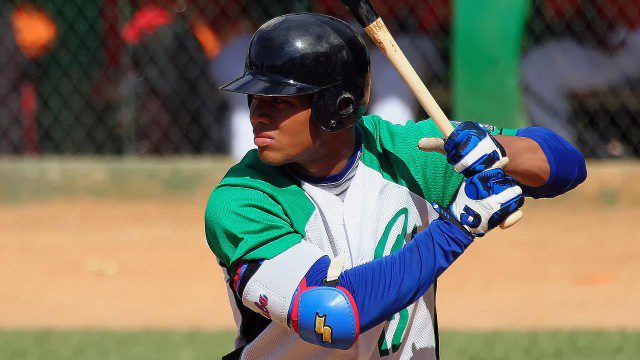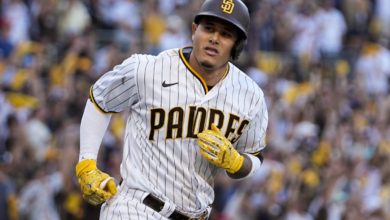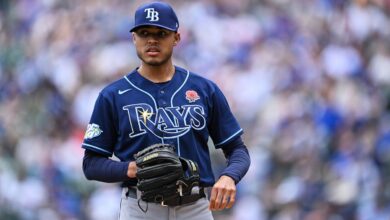


Now that Major League Baseball has adopted President Obama’s decision to loosen sanctions against Cuba, a new chapter in the game’s history is about to unfold. I’ll do my best to explain as we wade through these waters of uncertainty.
Maybe we should call it the Yoan Moncada era, since the 19-year-old projected superstar will immediately benefit most from this landmark change in policy. New baseball czar Rob Manfred gave the go ahead, and there will undoubtedly be some fine print to contemplate. But let’s keep it simple. Basically, any Cuban player who establishes residency in a “third party” country can now become a free agent and sign with any big league organization. Waived is the extra step of gaining clearance from the Office of Foreign Asset Control, which makes sense since most ballplayers from Cuba escape the Communist island with nothing except the clothes on their backs. Clearly, though, the reaction from this ruling will spur spontaneous spending that will favor large market franchises.
In its present form, the international selection process needs an overhaul almost as badly as this country’s immigration laws. Each year following the amateur draft in the states, teams have the opportunity to participate in an “auction” of promising teenagers from the Dominican Republic and Venezuela. Occasionally, a kid from Colombia or Central America will get picked, but only if he has the connections to perform in a showcase setting. Mexican prospects are not included due to restrictions enforced by the republic’s powerful summer league.
Each organization is allotted pool money annually with a cap of $700,000, but wealthier teams routinely overspend even if they are penalized. Cuban athletes, however, already are professionals, and there are some who have the ability to make an immediate impact. Players under the age of 23 with less than five years of experience in Cuba will fall within the selection guidelines. Older veterans are exempt from any restrictions and can sign with the highest bidder. The following Cubans are on my top-five list, after Moncada, and they are certain to be pursued by potential employers:
Yoan Moncada
age 19, 6′-2″, 205 lbs
second/third base
Cream of the crop, top of the heap, or whatever description you wish to use. Truly a five-tool player and switch-hitter with power to all fields. Defensively versatile and more than adequate at several positions. Offer will probably top out at $50 million, because teams over the cap will have to pay a 100 percent luxury tax.
1. Hector Olivera
age 29, 6′-2″, 220 lbs
second/third base
Big right-handed power and athletic ability. Veteran who leads by example and not subject to international cap restrictions. Had health issues and missed the entire 2012-13 Serie Nacional, but rebounded nicely last year and is still in his prime. Numerous clubs think he will be the consolation prize, which is nothing to spit on.
2. Andy Ibanez
age 21, 5′-10″, 190 lbs
second base/shortstop
Lacks the size of Moncada and Olivera and not as flashy, but extremely solid in all phases of the game. Bats from the right side with good contact skills. Smart base runner although not overly fast. Certainly carries a smaller price tag than Moncada.
3. Vladimir Gutierrez
age 18, 6′-3″, 175 lbs
right-handed pitcher
Average fastball that will get better with added strength. Long arms and excellent extension is a plus. Breaking pitches have ridiculous tilt. Rumors are swirling that the kid has ties to Jay-Z, the rapper turned businessman/agent.
4. Jose Fernandez
age 26, 5′-10″, 185 lbs
second base/shortstop
Perfect two-hole hitter with excellent bat control. Defense is solid but with limited range and arm strength and projects better at second base. Fernandez was known to have intentions to defect, but insiders think he’s still in Cuba.
5. Luis Yander La O
age 22, 6′-0″, 195 lbs
third/second base
Interesting young man along with his name. Intriguing batting skills coupled with a slick glove. Outstanding foot speed. Age would best serve him to stay in Cuba another year and build experience.
Yes, there are other fringe players who will also be courted by major league teams anxious to buy into baseball’s latest trend. Among others, they would include Norge Cruz, Guillermo Aviles and giant-sized pitcher Vladimir Garcia. But truth be told, these guys are probably no better than many clubs already have down on the farm. The rest are veterans like Yulieski Gourriel and Frederich Cepeda who have government-approved contracts in Japan and are loyal to the revolucion, despite the fact that it costs them a percentage of their paychecks.
Although they stumbled into the playoff round with a 1-3 record, Cuba’s Pinar Del Rio winter ball club edged Mexico’s Culiacan Tometaros 3-2 to win the Caribbean Series championship. And they accomplished the feat without Gutierrez and 30-year-old shortstop Danier Moreira, who both defected shortly after the tournament began. The pair were aided by a small group of activists headed by internationally acclaimed painter Williams Carmona, who was cheering for the Cuban team while coming to the rescue of its players if help was requested. But because this prestigious baseball event was held in Puerto Rico and on American soil, it’s not certain how this asylum issue will be resolved in terms of eligibility to sign, at least in the case of Gutierrez. Most Cubans who flee Fidel’s regime take refuge in Mexico, although Moncada settled in Guatemala.
Retired commissioner Bud Selig was in favor of an international draft, and Manfred was a Selig confidant expected to explore that approach. Such a scenario could help insure continued parity among all 30 teams. It would also be a potential nightmare to certify important identity documents and define slot flexibility, which in itself is extremely complicated. And what countries would be willing to go along with this plan? Certainly not Mexico. Los Angeles Dodgers first baseman Adrian Gonzalez has suggested that the Liga Mexicana has “hampered” the development of young talent there, and has partnered with Telmex to start a league of his own in the 14-15 age class.
I have said before that they only viable solution in dealing with the influx of Cuban players is to initiate a posting system. It has worked in Japan as well as Korea and if regulated properly, would make sure that the Cuban government, the player and his agent are all properly compensated. A grand total of 25 Cubans were part of The Show in 2014, which is not a large number compared to thousands of ordinary folks who risked their lives in search of a better future. Now that Manfred has opened Pandora’s box, it’s time to huddle up with Cuban officials and make them an offer they can’t refuse.





